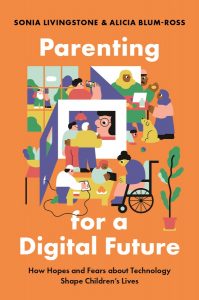 Finally, our book is out in the US, and almost in the UK and elsewhere. Forgive us a slightly different style of blog post, but we’re excited to fill in readers of Parenting.Digital.
Finally, our book is out in the US, and almost in the UK and elsewhere. Forgive us a slightly different style of blog post, but we’re excited to fill in readers of Parenting.Digital.
“Parenting for a Digital Future” asks how parents manage digital devices, what they should expect of them, and why these questions are so contested within families, among policymakers and in the media. Based on rigorous and in-depth fieldwork with diverse families around London, we argue that “digital parenting” is not only about technology, salient as this may seem. Indeed, family practices and values around technology have become a crucial means by which people explore pressing dilemmas over how to live, what constitutes wellbeing and what “good life” to hope for.
By inviting parents to look back to their own childhood and then forward to their children’s futures, we first position parenting in relation to the risk society before showing how digital technologies intensify families’ opportunities and risks in distinctive ways. We introduce three distinct genres for “digital parenting” – embrace, balance and resist – and we explore how these play out in terms of screen time, social inequalities, geeky families, parents of children with disabilities, and more.
Some of our key arguments are that:
- Families are living through a time of significant change – including reduced welfare, greater inequality and insecurity, transformations in family structure and geography. But it seems to be the absence then and presence now of digital technologies that marks the difference, acting as a lightning rod for a host of contemporary anxieties. And it is digital technologies (unlike other social changes) that parents feel they should be able to control.
- Consequently, we argue that the digital has become the terrain on which we negotiate who we are – our identities, relationships, values, and our children’s life chances. This explains why parents’ anxieties and family arguments about technology are so fraught. It also raises questions about what difference the digital makes, given its particular affordances, and now that children’s lives are becoming digital by default.
- The book offers a strong critique of popular screen time advice, especially that which exhorts parents to police their children’s digital activities, or to watch the clock instead of engaging with their child. We offer an alternative vision of digital families that goes beyond media panics to situate understanding rooted in parents’ real lives, to endorse negotiation in the “democratic family,” parent-child joint media engagement and the diversity of parents’ solutions according to their values and circumstances.
- But for digital parenting, parents have even fewer places to turn – our national UK survey shows how they can’t turn to own parents as they can for other advice (e.g. food, sleep), and the rapid pace of technological change makes things even harder. Still, we find that, with relatively little support parents are finding their own way, often by investing in a range of nonformal learning environments centred on technology – we studied a high class coding camp, an alternative/creative digital media centre, an after-school coding club in a low-income public school and, of course, the informal learning opportunities that parents provide at home.
- We pay a lot of attention to social class, finding that families are increasingly expected to conform to the middle class families’ expectations of effortful investment in children’s digital media learning, but with very unequal outcomes. The case of “coding as the new Latin” illustrates this clearly.
- When we look to the future, we can’t say for sure which practices will pay off. But we show how the families most in need or already facing more risk are often those who place the most hopes in technology, and embrace it the most enthusiastically. This is especially the case for the families whose children have special educational needs and disabilities, and for some of the “geeky” families who have chosen to vote with their feet for a digital future.
 In all, the book reveals the pincer movement of parenting in the digital age, in which parents are, on the one hand, more burdened with responsibilities given the erosion of state support and an increasingly uncertain financial future and yet, on the other, charged with respecting and encouraging the agency of their child as they negotiate “the democratic family”. We conclude by calling for change that supports rather than criticises parents, refuses to treat them as voiceless or “hard to reach”, and avoids either homogenising parents as if they are all the same or “responsibilising” them with their own individual burden of risk. We set out our recommendations in the last chapter.
In all, the book reveals the pincer movement of parenting in the digital age, in which parents are, on the one hand, more burdened with responsibilities given the erosion of state support and an increasingly uncertain financial future and yet, on the other, charged with respecting and encouraging the agency of their child as they negotiate “the democratic family”. We conclude by calling for change that supports rather than criticises parents, refuses to treat them as voiceless or “hard to reach”, and avoids either homogenising parents as if they are all the same or “responsibilising” them with their own individual burden of risk. We set out our recommendations in the last chapter.
Blurbs
“The best book yet written on the dilemmas of parenting in the digital age, a period of constant innovation and change for adults and children alike. Based on in-depth studies of family life, and giving close attention to inequality and deprivation, this work is an indispensable source both for academics and the lay reader.” –Anthony Giddens, House of Lords and King’s College, Cambridge
“In this rare parents-eye view over the digital landscape, Livingstone and Blum-Ross cut through polarized debates and one-size-fits all solutions. This book is a must-read for anyone seeking a deeper understanding of how digital technology intersects in unexpected and varied ways with the everyday lives of diverse families.” –Mimi Ito, Director of the Connected Learning Lab, University of California, Irvine
“Parenting for a Digital Future offers readers a rich and deeply nuanced picture of how children’s digital technology use reflects the concerns and hopes parents have for bringing up balanced and successful children. This book is a must read for anyone who cares about children and families, including scholars, policy makers, advocates, educators and, most importantly, parents themselves.” –Amy Jordan, Professor, School of Communication and Information, Rutgers University
Links
“Parenting for a Digital Future: How hopes and fears about technology shape children’s lives” is just published in the US and in the UK in September. It’s here on Amazon, and review copies are available from academic.reviews@oup.com.
The first chapter of the book is free to read until 24 October at Expectations. To watch or hear us discuss the book:
- Watch Sonia and Alicia talk about the book in Conversations with Common Sense
- Listen to Sonia and Alicia interviewed for NPR, When it comes to screens, kids need a guide – not a disciplinarian
- Sonia talks about the book for UCL’s Lifecourse Podcast
- Sonia talks about digital parenting during COVID-19 for the NHS’s Good Thinking podcast
- Watch the US book launch, Parenting for a Digital Future. A conversation with the authors hosted by Sesame Workshop: Joan Ganz Cooney Center
- Watch Sonia’s TED Talk, Parenting in the digital age
Read more at:
- Author interview: Q and A with Sonia Livingstone and Alicia Blum-Ross, for the LSE Review of Books
- Our blog for the Connected Learning Alliance, Coding as the New Latin? Can Code Clubs Provide a New Pathway for Low-Income Children and Help Close the Digital Divide?
- Our guest post for Mumsnet, The contradictions of digital parenting
- How are families responding to unprecedented digital transformation and why? Interview with InterMedia
- Interview with Sonia in the Chronicle of Evidence-based Mentoring
- Sonia’s blog on Parenting for a Digital Future for Common Sense Media
- Our open-access article in Cultural Science: Parents’ Role in Supporting, Brokering or Impeding Their Children’s Connected Learning and Media Literacy
- Our open-access article for Nordicom: The trouble with “screen time” rules
- The first book review is already out, by NetFamilyNews
Upcoming dates:
Register for Sonia Livingstone’s “Distinguished Contribution to Social Psychology Award Winner Address” on 3rd September
The book will be launched at LSE on 24th September at 4pm: please register here.
More events are in the works… Follow us on Twitter @Livingstone_S and @AliciaBlumRoss and subscribe to www.parenting.digital
First published at www.parenting.digital, this post gives the views of the authors and does not represent the position of the LSE Parenting for a Digital Future blog, nor of the London School of Economics and Political Science.





